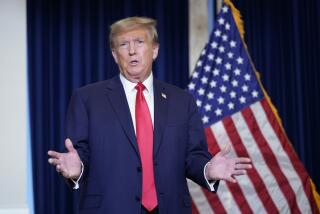Free Trade at the Fore of Races
Jack Davis remembers the night he left the Republican Party over free trade: Nov. 17, 2003, after he paid $2,000 to meet Dick Cheney at the upscale Park Lane Restaurant in Buffalo, N.Y.
Davis, a furnace-parts manufacturer and lifelong Republican, had hoped to convince the vice president that their party’s free-trade policies hurt workers. He never got the chance. And after Davis started sharing his views with reporters at the event, he said, Cheney’s staff ordered him to leave.
Within weeks, Davis had become a Democrat; ended his support of the libertarian Cato Institute and the conservative Heritage Foundation; and started a group, Save American Jobs, to toughen trade barriers.
Now Davis is a Democrat challenging four-term Rep. Thomas M. Reynolds (R-N.Y.) and calling for restrictions on foreign goods. And Reynolds, who leads the committee that coordinates election strategy for House Republicans nationwide, is spending unexpected time and money defending his western New York seat as Davis attacks him for supporting trade agreements he says are “hammering the middle class.”
With wages stagnating for many Americans, trade has become a significant campaign factor this fall in parts of New York, Pennsylvania, Georgia and other states. In Ohio, Michigan and North Carolina, where manufacturers continue to shutter plants and cut jobs, free trade has become a major issue of campaigns.
In Michigan, Democratic Sen. Debbie Stabenow, who is seeking reelection, recently ran a TV ad highlighting her effort to create a “trade prosecutor” to investigate unfair foreign competition.
In Ohio, Republican Sen. Mike DeWine and his Democratic challenger, Rep. Sherrod Brown, have repeatedly sparred over trade, with Brown calling for “fair-trade” policies that hold foreign companies to U.S. workplace standards.
In North Carolina, Republican Rep. Robin Hayes, a textile heir, is under attack from his opponent, a former textile worker, for supporting the Central American Free Trade Agreement last year. Hayes cast the deciding vote.
In Reynolds’ district, some of the largest manufacturers -- Eastman Kodak Co., Ford Motor Co. and Delphi Corp. -- are cutting back. Davis blames competition abroad for the job losses and wants tariffs against countries that have flooded U.S. markets with cheap goods.
Reynolds, who also supported CAFTA -- the major trade deal of the current Congress -- aired a TV ad this month saying his opponent’s tariff proposal was “really a tax increase on families, raising the cost of everything.”
Recently, Reynolds brought Virginia Rep. Robert W. Goodlatte, a fellow Republican and chairman of the House Agriculture Committee, to the district to meet about 50 dairy farmers and to showcase his efforts on their behalf. But the farmers complained about trade, and they wanted to know what Reynolds was doing to help them compete against foreign companies.
“He hasn’t really answered the question of what he’s going to do to make free trade fair trade,” said farmer Kathy Youngers, who attended the meeting but has not decided whether to vote for Reynolds.
Davis may have a better chance of persuading voters than in 2004, when he ran against Reynolds on a similar trade platform and lost by 12 percentage points. Although polls indicate concerns about the economy are easing, many people are still anxious and may be open to an appeal based on tougher trade policies, said Wendy Schiller, an associate professor of political science at Brown University.
In Ohio, Brown, who led House opposition to CAFTA last year, appeared in a recent TV ad in front of a factory with a “Plant Closed” sign on its fence. “My opponent supported the trade agreements that cost us these jobs. He says it’s just business -- I say it’s wrong,” Brown says.
DeWine says he pushed “fair-trade” legislation including tariffs on foreign steel and measures returning profit from the sale of illegally dumped foreign goods to U.S. companies. But he also defends free-trade deals that he says create jobs by increasing exports.
“These agreements bring foreign trade barriers down for U.S. goods,” he said in a statement last week. “U.S. tariffs were already low, and these trade agreements level the playing field” by lowering the tariffs imposed on U.S. exports.
Reverberating in some campaigns is last year’s CAFTA fight.
In Georgia, Republican challenger Max Burns faults Democratic Rep. John Barrow for voting against CAFTA. At a campaign appearance, Burns waved letters from officials at a local Jockey International Inc. plant pleading for CAFTA. But Barrow said Jockey was an example of how CAFTA failed workers. In July, Jockey announced plans to relocate to Central America, laying off 203 Georgia workers.
In upstate New York, engineer David Curry, 64, lost his job when a steel-parts manufacturer downsized its staff six years ago, and said he planned to vote for Democrat Jack Davis because Davis opposed free trade.
“It has changed western New York dramatically,” Curry said. “Used to be blue-collar and proud, and now it’s just the Rust Belt.”
More to Read
Get the L.A. Times Politics newsletter
Deeply reported insights into legislation, politics and policy from Sacramento, Washington and beyond. In your inbox three times per week.
You may occasionally receive promotional content from the Los Angeles Times.







